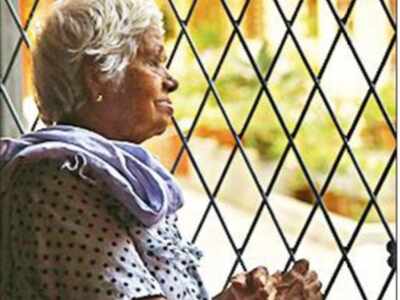Top Searches
- News
- India News
- Lockdown: Old age homes stare at closure

The national lockdown has dealt a severe blow to old age homes across the country, many of which are now gasping for breath as their fund flow has shrunk to a trickle with most corporates remaining shut and benevolent donors staying home amid the Covid-19 pandemic.
“Even basic functioning of elderly homes has come to a halt due to lack of financial resources. If this continues, we may have to close down our home,” says Jai Vardhan Bhardwaj, who assists a shelter for the elderly in Jaipur.
In Pune, a few homes are on the verge of collapse. “Even self-funding inmates are unable to pay. As a result, 20%-30% homes have closed in Pune, while some that have an average 50% occupancy are not admitting new people,” says Amar Shinde, founder of two care centers in Pune and Mumbai.
According to administration officials of old age homes in UP, funds have declined by as much as 75%-80% during the lockdown.
Bhavneshwar Sharma, Help Age India head for Punjab, Haryana, J&K and Chandigarh said: “Usually, we get a substantial amount of donations in April; but this year it’s nil. Our local branches tried to contact a few corporates, but got no response,” he says. His units are drawing funds from Help Age India’s central pool to meet recurring expenses.
“Our rental income, with which we used to run our home, has stopped due to the lockdown… Still there are people who are regularly donating and the rest we are managing from our own resources,” says Balwinder Singh Chahal, who runs Amritsar’s oldest home, Bhai Kanhaiya Ji Birdh Ghar.
With lack of food, medicines and funds, several shelter homes in Patna are in a terrible condition.
For most free-of-cost old age homes in Tamil Nadu that run on charity, the lockdown has wiped off a chunk of donations due to which maintenance, upkeep and supply of resources like food and medicine have been hit. “Now, we are cutting down on food varieties to save money for regular medication, such as BP, diabetes drugs, painkillers and dressing material,” says Edgar Jones Paul, Little Drops founder.
“Even basic functioning of elderly homes has come to a halt due to lack of financial resources. If this continues, we may have to close down our home,” says Jai Vardhan Bhardwaj, who assists a shelter for the elderly in Jaipur.
In Pune, a few homes are on the verge of collapse. “Even self-funding inmates are unable to pay. As a result, 20%-30% homes have closed in Pune, while some that have an average 50% occupancy are not admitting new people,” says Amar Shinde, founder of two care centers in Pune and Mumbai.
According to administration officials of old age homes in UP, funds have declined by as much as 75%-80% during the lockdown.
Bhavneshwar Sharma, Help Age India head for Punjab, Haryana, J&K and Chandigarh said: “Usually, we get a substantial amount of donations in April; but this year it’s nil. Our local branches tried to contact a few corporates, but got no response,” he says. His units are drawing funds from Help Age India’s central pool to meet recurring expenses.
“Our rental income, with which we used to run our home, has stopped due to the lockdown… Still there are people who are regularly donating and the rest we are managing from our own resources,” says Balwinder Singh Chahal, who runs Amritsar’s oldest home, Bhai Kanhaiya Ji Birdh Ghar.
With lack of food, medicines and funds, several shelter homes in Patna are in a terrible condition.
For most free-of-cost old age homes in Tamil Nadu that run on charity, the lockdown has wiped off a chunk of donations due to which maintenance, upkeep and supply of resources like food and medicine have been hit. “Now, we are cutting down on food varieties to save money for regular medication, such as BP, diabetes drugs, painkillers and dressing material,” says Edgar Jones Paul, Little Drops founder.
FacebookTwitterLinkedinMail
Start a Conversation
end of article
Trending Topics
Quick Links
Coronavirus in MumbaiCoronavirus in KolkataCoronavirus in HyderabadCoronavirus in DelhiCoronavirus in BangaloreCoronavirus symptomsCoronavirus in IndiaWhat is CoronavirusCoronavirus NewsSolar EclipseNPRWhat is NRCCAB BillCAB and NRCRTI BillPodcast newsLok SabhaShiv SenaYSRCPCongressBJP newsUIDAIIndian ArmyISRO newsSupreme Court